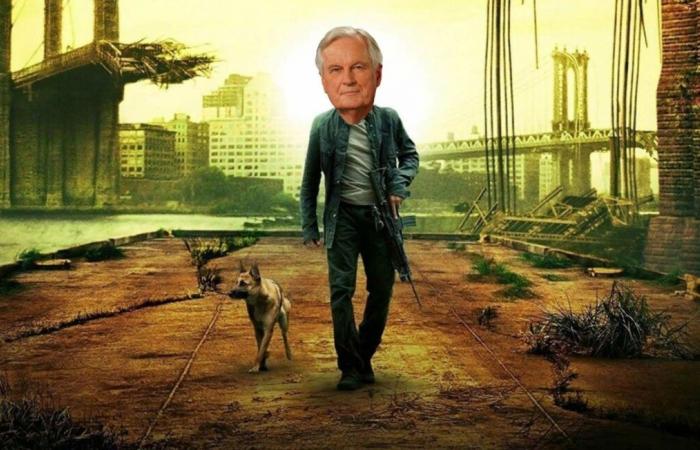Despite some concessions in recent hours, Michel Barnier is more than ever in an ejection seat with threats of censorship from the National Rally and the left. However, he drew up a new argument on Tuesday to remain Prime Minister in 2025. If he leaves Matignon, it will be nothing other than the apocalypse for the public accounts, already not at best with a deficit of 6%. On the agenda according to Michel “Cassandre” Barnier: “A storm probably quite serious and serious turbulence on the financial markets” in the event of censorship, he predicts.
“We already borrow at very high interest rates. They are currently almost at the level of Greece,” he added to the TF1 newspaper on Tuesday. A self-fulfilling prophecy, since the next day, France was indeed borrowing at higher rates than Athens. However, should we believe this bird of ill omen when it announces a rain of frogs on our economy and the water of the Seine transformed into blood?
A string of bad news
For the seven plagues of Egypt, we still have doubts. But “the threat to the French economy is very real, and we must not underestimate it,” warns Stéphanie Villers, macro-economist. Same analysis from Anne Sophie Alsif, economic head at the Bureau of Economic Information and Forecasts (BIPE). She describes already catastrophic rates: “There is a gap of 82 points with Germany, against a historical trend of only 40 points. These are already extremely high borrowing rates, higher even than Spain or Portugal”, two countries known for their very latin olé olé public finances. If the predicted storm is not quite here yet, strong gusts of 110 km/h are already being felt.
As for the markets, “they predict an unstable political situation in the long term,” continues Anne-Sophie Alsif. The debt burden – public money used only to repay the interest on previous debts, which is therefore not used for any public services or aid – is likely to rise sharply. It is now at 50 billion, and could rise to “70, even 80 billion”. Which, as you might imagine, would not be good news at all. “We already can't make 20 billion savings, so having to make 30 more…”, the expert despairs.
To drive home the point, Germany is in recession “and has announced that it was going to borrow more,” says Stéphanie Villers. “However, it is a country considered to have non-risky assets, and which the markets will largely prefer. »
Can we do worse? Yes, we can!
But if the situation is already this catastrophic, would more or less censorship from Barnier really make things worse? Well yes, clearly! Anne Sophie Alsif for the rest of the bad news: “The question is not so much about the censorship of Michel Barnier, the markets are quite indifferent to his personal case. The problem is that his replacement is very uncertain – from the left, from the right, centrist, from the National Rally? – and therefore the budgetary measures to come too. » And the markets don't like that at all.
Stéphanie Villers illustrates: “When you make a loan from the bank, you must justify a project behind it, for example the purchase of housing. Here, France should borrow without justifying a budget behind it, and hope that the markets give it money blindly. It’s daring…” Especially since with a government thrown overboard, the 2024 budget would be renewed for lack of having validated a new one. A budget which has demonstrated all its ineffectiveness, partly causing the current public slippage.
Bad news, sure, but how bad?
So, that's it, fireballs will fall on Bercy? “There will be no bankruptcy,” calms Jacques Le Cacheux, professor of economics at the University of Pau. “We saw even worse borrowing rates in 2012 and it was not the apocalypse. The French debt remains one of the best rated in the world, and if it is certainly very important, other countries have a more significant one, such as Italy. Another way to reassure yourself is the European Union. “The Central Bank is much more interventionist and will not let its second largest economy fail.” A lesson learned hard in 2012, we always come back to it, when the ECB dragged its feet before finally reassuring the markets. But be careful: “France is constantly playing with fire and we must stop thinking of ourselves as untouchable,” warns Stéphanie Villers.
The latest information on the 2025 budget
As for the rates which are now above Greece, “we are talking about current Greece and not the situation at the time”, recalls Jacques Le Cacheux. “It’s a symbol that should provoke a reaction, but overtaking Greece doesn’t mean anything in itself,” continues Anne Sophie Alsif.
The fact remains that without meaning the death of all the first born in the country, government censorship would be a bad scenario for the average consumer. “Let us be clear: there will be no more purchasing power or public services in the event of a financial crisis,” explains Anne Sophie Alsif. “Taxes are likely to increase sharply, and interest rates for individuals will follow those of France,” adds Stéphanie Villers. Not the apocalypse, but not heaven.






